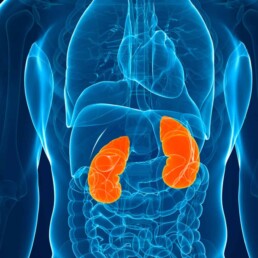Prescriptions and over-the-counter medications can be used safely and effectively to help treat a long list of problems. However, they may also have side effects that contribute to a “leaky gut” which may increase the risk of kidney disease, as well as other chronic diseases. In this blog, we will discuss leaky gut and medications.
Antibiotics
It is well known that antibiotic use leads to significant disruption in microbial balance. This leads to dysbiosis and subsequent disruption of the protective layer in the gut wall – commonly called “leaky gut” or intestinal permeability.
The “leaks” in the gut may bacteria DNA and undigested food to leak into the bloodstream contributing to inflammation and disease progression. You can learn more about that in our blog on inflammation.
NSAIDS
Nonsteroidal anti-inflammatory drugs or NSAIDs include common over-the-counter medications like ibuprofen and naproxen as well as prescription-strength diclofenac, meloxicam, and celecoxib. These are usually used to help reduce pain and swelling associated with inflammation.
Aspirin
An NSAID used by millions for the prevention of heart attack and stroke, often in low doses, is Aspirin. Kidney patients are at higher risk for heart disease and many take low-dose aspirin. Aspirin works to reduce heart disease risk by reducing inflammation and blood-thinning; however, it’s generally considered safe and beneficial in low doses.
At a very low dose, the side effects may be less pronounced than the effects of regularly using higher dose NSAIDs for pain relief. However, studies show that aspirin increases intestinal permeability when taken at higher doses.
Acetaminophen
Acetaminophen is one of the most commonly used medications for pain and fever. It’s technically not an NSAID, but instead, works by a slightly different mechanism that’s considered safer regarding the risk of causing ulcers.
However, it has also been found to also contribute to a leaky gut. Furthermore, researchers found that it may also help promote the passage of unfavorable bacterial toxins into the bloodstream, promoting inflammation.
But that’s not the only concern with the chronic use of acetaminophen. The drug is well known to negatively affect liver function. This is because acetaminophen depletes glutathione (the body’s most important antioxidant) and significantly slows the liver’s ability to remove toxins.
Even though acetaminophen use has not been directly linked to kidney damage, the accumulation of toxins, depletion of glutathione, and increased intestinal inflammation can worsen or promote kidney disease in susceptible individuals
Steroids
Steroids, like dexamethasone, prednisone, or methylprednisolone, are also used as anti-inflammatory agents sometimes for more extreme cases of rheumatic pain. But they are also used in treating asthma, allergic reactions, or reducing inflammation in the lungs to improve breathing.
One would think that medications have anti-inflammatory properties and they would decrease inflammation in the gut. However, the opposite is true.
A well-known and common side effect of these medications are stomach ulcers and increased intestinal permeability. Studies have demonstrated that they cause disruption to the gut barrier in healthy individuals. In other words, the side effects of NSAIDs have been shown to contribute to disease progression in kidney patients by alterations in the integrity of the GI.
Proton Pump Inhibitors (PPI)
Proton pump inhibitors (like omeprazole, pantoprazole, esomeprazole, etc) are usually used for the treatment of stomach ulcers, reflux, and occasional heartburn. They work by reducing the stomach acid being made.
However, recently they’ve been found to cause kidney damage. Because these medications lower the pH (the acidity) of the stomach and small intestine, they cause food to not be digested properly, which leads to nutrient malabsorption. Also the change in the acidity of the stomach cause dysbiosis especially in the small intestines (known as small intestinal bacterial overgrowth or SIBO)
Phosphate Binders
Medications like calcium acetate, lanthanum, and sevelamer are in a class of medication we call phosphate binders. These are commonly prescribed by kidney doctors to prevent a common complication of kidney disease, elevated phosphorus. Phosphate binders work by blocking the absorption of phosphorus in the gut and preventing it from entering circulation. This protects the kidneys since elevations of phosphorous are connected with increased kidney damage.
Another interesting benefit of these medications is that they bind some bacterial toxins and prevent their absorption into circulation. Therefore, there are two mechanisms that protect the kidney from further damage.
However, recent research shows that these medications may change the intestinal balance of good bacteria which may contribute to further damage to the intestinal wall. More research needs to be done to determine the risk vers benefit of using phosphate binders in some cases.
Bottom Line
It’s a good idea for patients at risk of or managing kidney disease to understand the risks and benefits associated with your medications. If you are working with a Functional Medicine practitioner that can help you learn how to repair your gut wall and balance the gut bacteria, gut wall, reducing inflammation and helping you better manage your kidney disease.
Talk to your doctor or pharmacist if you have questions about your medication; never discontinue medication without speaking to your doctor.
References
J Clin Pharm Ther. 2003 Aug;28(4):289-94
Basic Clin Pharmacol Toxicol. 2015 Sep;117(3):195-203
Curr Pharm Des. 2015;21(35):5089-93
Cell Physiol Biochem. 2013;32(2):431-47
Kidney Int Suppl. 2009 Dec;(114):S12-9



